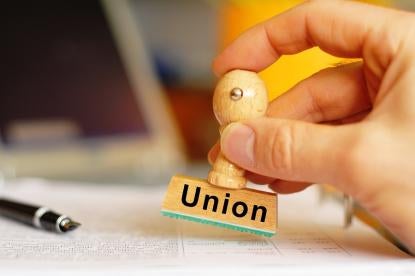The Don’ts of IBEW Local’s Dues Policy
IBEW Local 58’s policy requiring union members who want to resign their membership in the union or opt out of dues deduction to appear in person at Local 58’s union hall with a picture identification and a written request indicating the member’s intent violates the National Labor Relations Act, the U.S. Court of Appeals for the District of Columbia has ruled, upholding a decision of the National Labor Relations Board (NLRB).
After the institution of Local 58’s policy, a Local 58 member filed an unfair labor practice charge with an NLRB regional office. The NLRB’s General Counsel issued a complaint, and, after an adverse decision from an administrative law judge (ALJ), the employee and the General Counsel appealed to the NLRB. The NLRB reversed the ALJ, deciding that Local 58’s policy was an impermissible restriction on union members’ Section 7 rights to resign.
The Court said the requirement to resign in person and show a picture identification would “burden” members who live or work some distance from the union hall because it would “cost them time and money” and because some “resigning members [would] . . . wish[] to avoid a face-to-face encounter with a union representative.” The face-to-face requirement, the Court noted, “could present a particularly significant impediment for members who wish to resign during a strike or lockout.”
SEIU Fast Food Initiative on Fast Downhill?
According to the Washington Beacon, the Service Employees International Union (SEIU) last year reduced funding for its “Fight for $15” initiative “to the lowest level in four years.”
According to the movement’s website, Fight for $15 began in 2012 and today is “a global movement in over 300 cities on six continents” encompassing “fast-food workers, home health aides, child care teachers, airport workers, adjunct professors, retail employees – and underpaid workers everywhere.”
SEIU gave $13.3 million to the movement in 2017, down from $14 million in 2016 and approximately $23 million in 2014, according to Labor Department filings reviewed by the Center for Union Facts.
A few cities and states, such as New York and California, have adopted $15 minimum wages, but the movement largely has stalled. The Labor Department filings indicate that the SEIU gave $3.8 million directly to Fight for $15 and the Fast Food Workers Committee, two of the main organizing groups, $2.2 million to outside public relations groups, and $7.3 million to the various regional organizing committees.
Inspecting The Inspector General
According to a National Right to Work Legal Defense Foundation (NRWLDF) press release, the organization has asked the Council of Inspectors General on Integrity and Efficiency to review what the Foundation refers to as “apparent wrongdoing” by the NLRB’s Inspector General (David Berry) regarding his investigation that resulted in the NLRB’s withdrawing its Hy-Brand decision because of, as Berry found, a conflict of interest on the part of Board Member William Emanuel. (In that decision, the NLRB overruled its union-friendly Browning-Ferris joint-employer test.) NRWLDF is a nonprofit, charitable organization that provides free legal aid to employees.
Foundation President Mark Mix pointed out that “just a few years ago Berry gave the green light to Obama appointee and former Service Employees International Union lawyer Craig Becker to participate in cases involving the SEIU and its affiliates ….” The Foundation alleges that Berry’s reports were made public without redactions of the NLRB’s internal deliberative communications. The NRWLDF wants an investigation into whether Berry disseminated confidential NLRB deliberations and improperly disclosed outside the NLRB that he was investigating Emanuel.
One Big Happy Family
A dispute between NLRB member Mark Gaston Pearce, and Chairman John Ring over the joint-employer standard has gone public. Their tweet-a-thon arose in response to Ring’s proposal to solve the Board’s joint-employer conundrum through rulemaking.
Ring tweeted about the need for rulemaking because of “uncertainty over the standard.” This caused Pearce to observe, among other tweets, that “no party has asked for rulemaking,” “‘[u]ncertainty’ over the joint-employer standard exists only in the minds of those seeking to reverse Browning Ferris,” and “Board majority ‘considering rulemaking’ but @NLRB Chairman says ‘Board majority … working to issue proposed rule ASAP’ – certainly sounds like another objective is already set.”






 i
i


